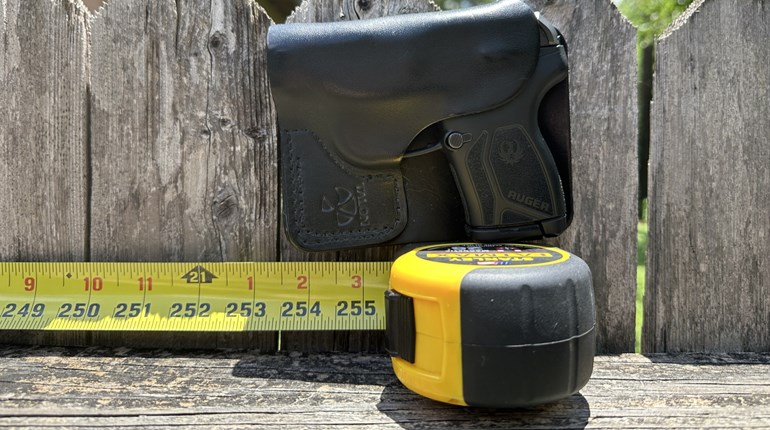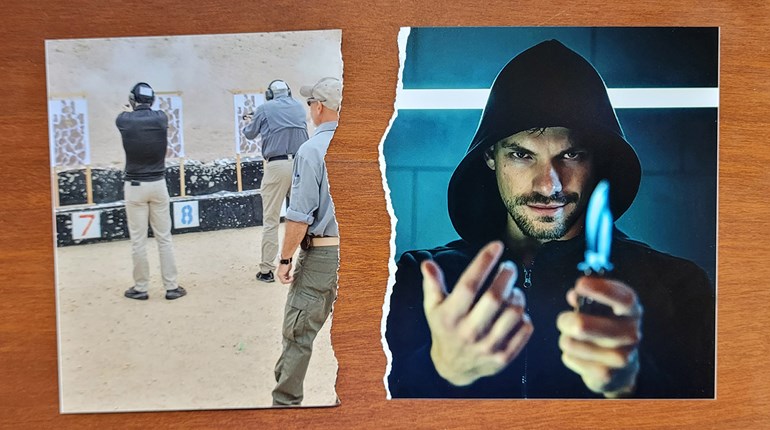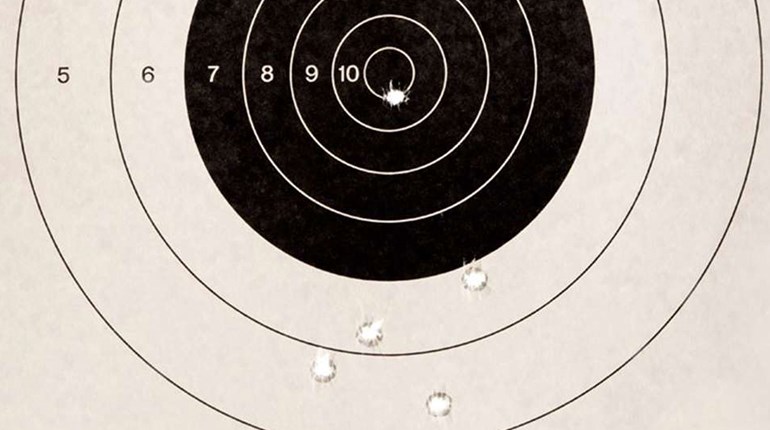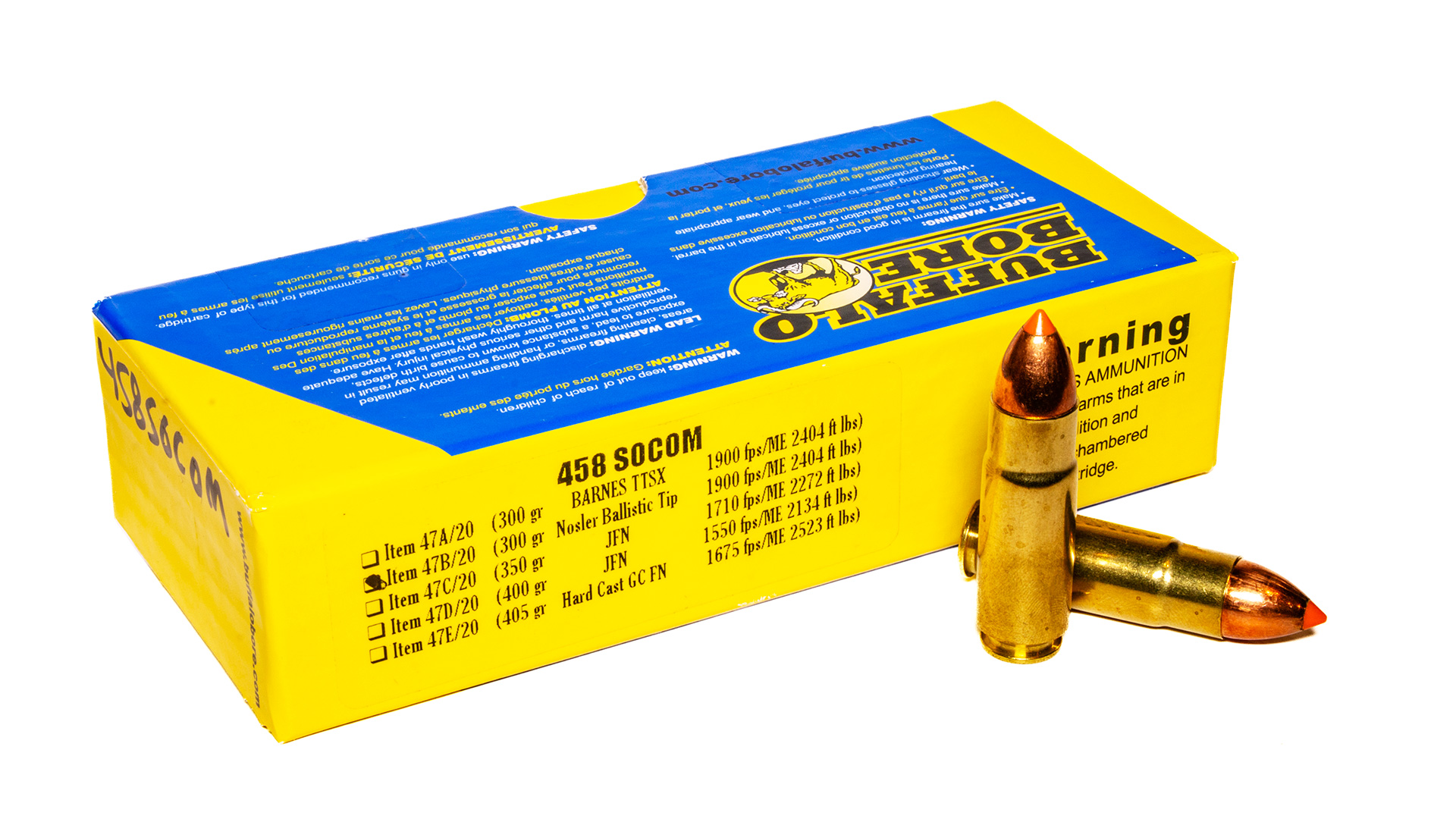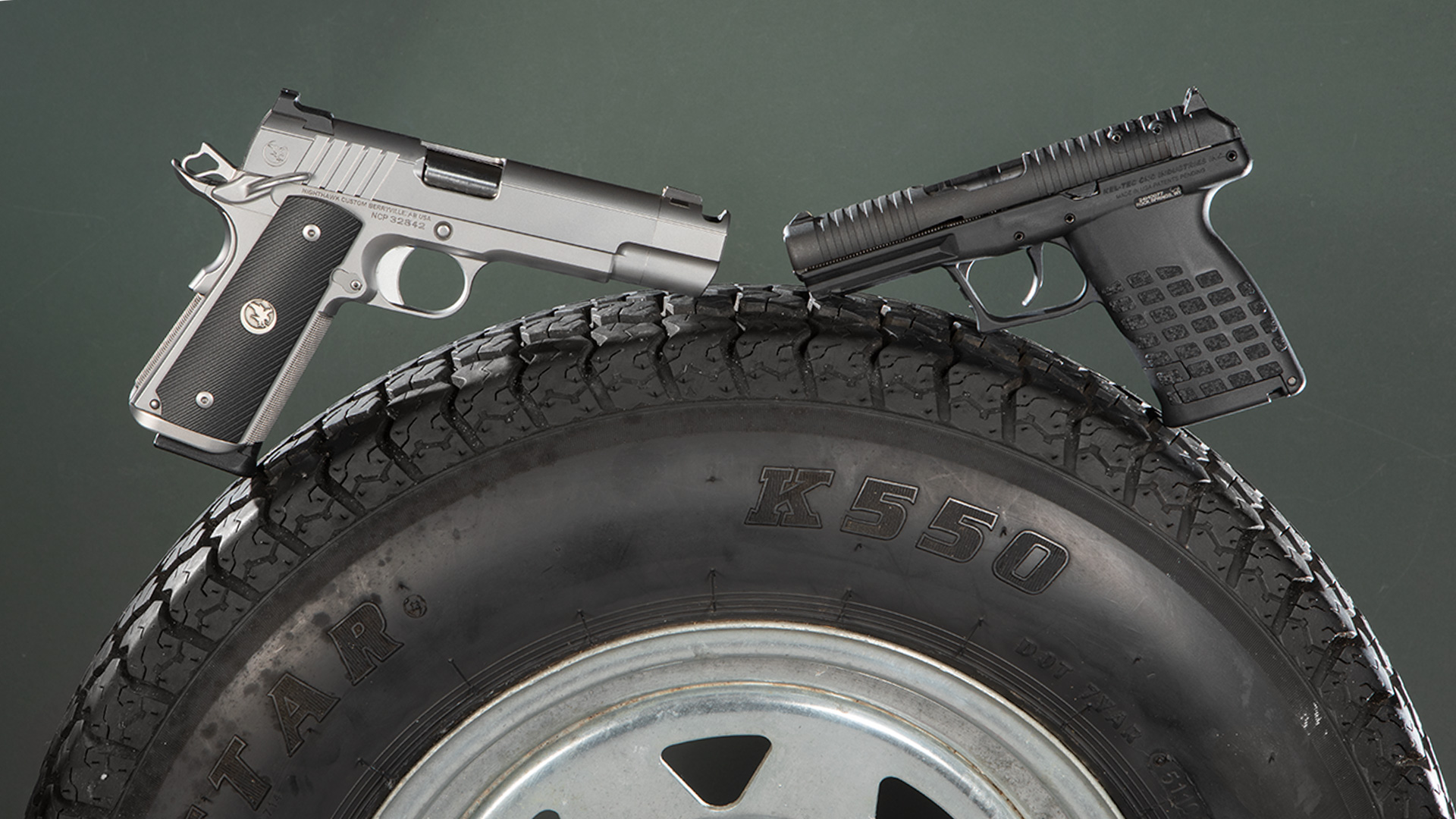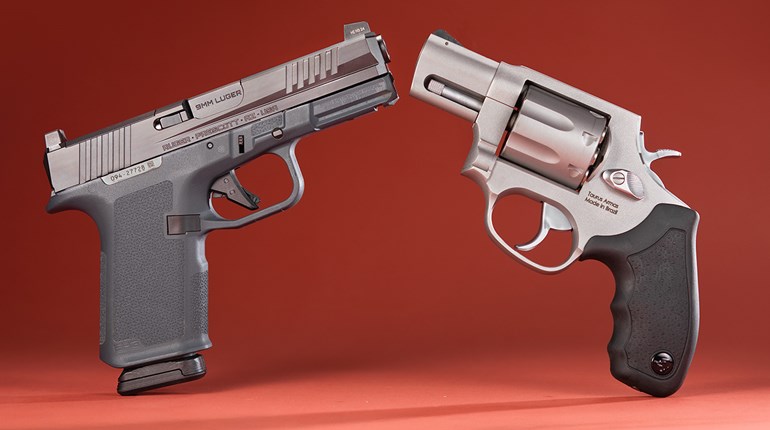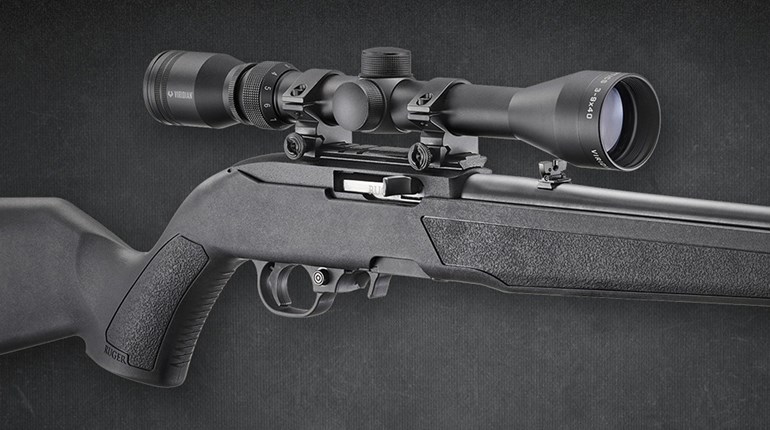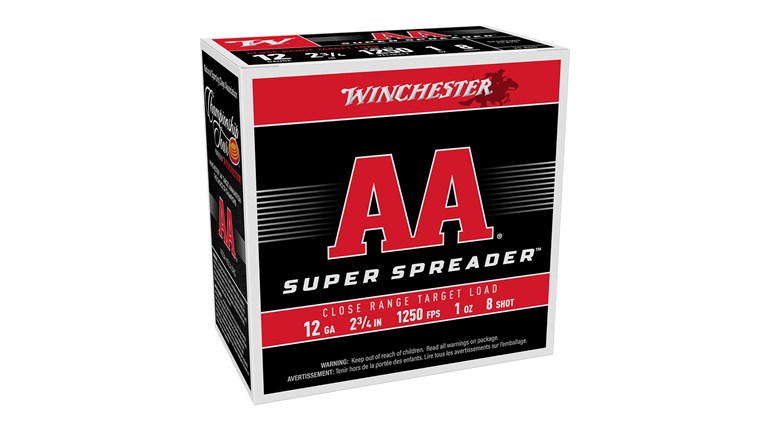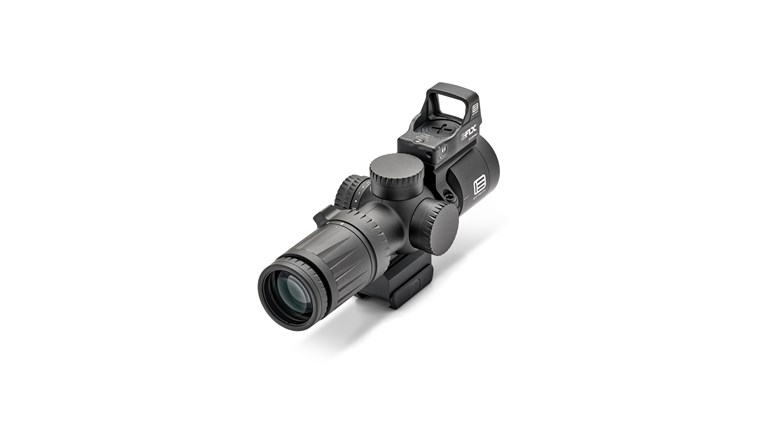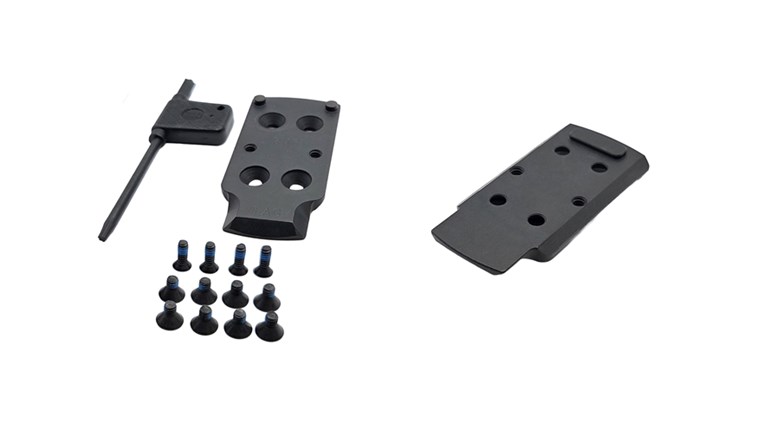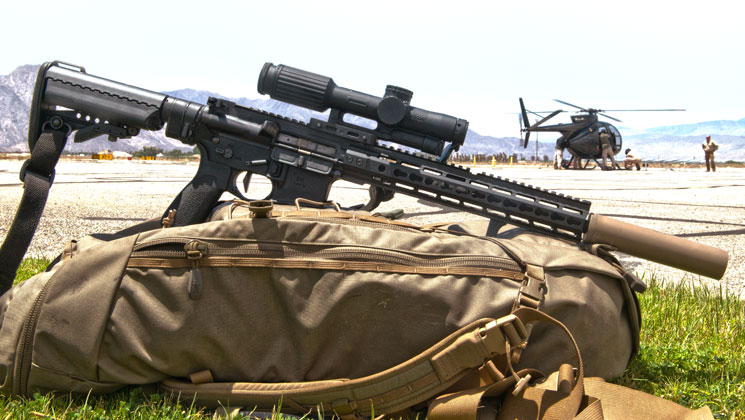
An LWRC IC-PDW equipped with a Delta P Design suppressor was used during training runs and range time, and proved to be an excellent system.
Crouched low, carrying the tools of the trade in your pack, you approach the helo from the 12-o’clock position. As it idles on the tarmac, the blades of the black MH-6 “little bird” rotate above as you and your gear are strapped in—it may be a rough ride. Settled in, your mission runs through your mind, working through every detail. Crew members work to prepare for the mission. You get the “thumbs up” and the blades spool up, the jet engine winds up and your adrenaline matches the whir of the blades. Training is over. It’s time to do this.

Lifting off, you slide to the side, turn and begin your final mental preparation as speed and altitude increase. Climbing, the world passes by as you move to your final staging area, just you, the wind and the cacophony of the rotors. The wind presses your legs against the skid, buffeting the small, high-performance helicopter around. Approaching the staging landing zone, you ramp up. Landing, you remove your rifle from your pack and run through pre-operation checks. Loaded, suppressed and ready to rock, you put a few rounds in the desert—just to be certain. A nod, then a thumbs up and lift off; this time winding through the canyon at low altitude, leaning out, ready to engage. Targets appear in your view, then your sights, and the fun really begins.

Shooting from a Helicopter
Shooting from a small, high-performance helicopter is the mainstay of movies, video games and war stories. Talk to most who actually serve (or served) in a Special Mission Unit (or similar military organization and they explain that is where it generally stays. While it occurs, it is anything but ideal. Given that most helicopters can be equipped with very high-volume small arms or rockets, hanging a human out of the door with a carbine is seldom necessary. A few police agencies have a need, but it remains a pretty specialized skill—realistically, more can go wrong than right. As a rule, the helicopter is transportation, not an ad-hoc weapons platform.

Still, whether hunting hogs or shooting steel or paper targets, there is just something awesome about the experience. Even those in some of our more-specialized military units never shoot out of helicopters. Therefore, given the chance, it is an opportunity you simply do not pass up.
Aegis Academy Heliborne Assault
Make no mistake, this is an experience designed to tap into your inner Jason Bourne more than it is preparation for a real-world operation. Originally designed to fill a contract for a large, non-military organization as a team-building experience, it is not preparation for the zombie apocalypse. It’s supposed to be fun, and it is.
Aegis Academy is run by Patrick Henry, a retired Marine with more than 22 years active duty, including several deployments to the Middle East. He also has extensive experience as a contractor providing training and high-risk dignitary protection. Having trained with him previously, I know him to be professional, personable and knowledgeable. His staff has significant real-world experience—about as much “been there done that” as you can get and remain alive. Like him, they are also well-seasoned and thoroughly professional.
The Training
This event was a sort of “shake out” for the class and part of a video shoot. It will prove useful as a promo video for Aegis, as well as 5.11 Tactical, the company on hand to shoot the video. It just meant a bit more work, and participants covered a broad spectrum of shooters. They ranged from combat Marines to those with zero experience, including a student who had never picked up an AR in her life. The rest were trusted clients and customers of Aegis Academy with various levels of training, much of it with Aegis.

Initial instruction occurs on the Pala Range in Pala, CA. Leaving the Pala Resort and Casino, you travel about a mile or so to the facility. Nestled in the hills of North San Diego County, the range is clean, well maintained and secluded from the public. Given the varying experience levels, the first day is all about bringing everyone up to speed on the rifle. The goal is to safely use the rifle in the helicopter, not become a combat master. That being said, given the quality of the cadre, everyone was able to learn something and improve. The training is based on practical use from those who have used these skills in harm’s way. Techniques were simple, proven and effective. Each trainer was clear, concise and professional. It proved valuable, as by the end of the day our new shooter was whacking the steel out to 200 yards like a pro. Everyone left with a confirmed zero and confidence operating the carbine.
Returning to Pala, our second day was all about getting used to shooting from a seated position. Targets were set up at ranges (25 to 100 yards) that would be encountered in the helicopter. Acceptable angles from the aircraft as well as toward the ground were covered. There was also a particular reload required, so equipment did not fly into the rotors. Muzzle discipline is always critical, but even more so in a helo. Muzzle-high may work for certain ranges, but not in a helicopter. Pointing your gun at the only thing keeping you from falling out of the sky like a rock is not acceptable. Everyone got a few runs in the “chair” and took time to confirm their rifle’s operation using the required frangible ammunition. Once done, we moved to the Pala fire station to get checked out on the helicopter.
Here was the biggest treat for me, as the pilots of the MH-6 were incredible, which one appreciates when hanging on for dear life. Their landing inside a small fire station looked more like a radio-controlled toy than a real aircraft. Their precision and control were astounding, and it was anything but a boring ride. Once harnessed up, we covered the safe means to approach and depart the bird, along with how we would be locked into the backseat area. Each participant went through it dry, then the chopper was fired up for hot loading and unloading.

Empty rifles were carried throughout to simulate live-fire runs. Once loaded up, the ride of my life began. The chopper lifted, flew sideways across the parking lot, turned 90 degrees on a dime, tilted forward and flew off. Passes were made with banking turns, flying low to the ground giving a feel for shooting on the move. Unlike the live-fire exercise, we were moving fast, pulling up as you approached the fire tower. Hovering next to, then slowly moving by the tower, each participant had their photo and some video taken by 5.11 media as we hung out the door.
Banking away for the return trip, we finally slid into the parking lot and off-loaded while the next shooter was strapped in. This ride was not only an adrenaline rush, it also prepared us for the next day’s live-fire exercise. Once done, it was time to convoy off to Borrego Springs and the final landing zone.

Live-Fire Runs
Moving to the expanses of the California desert, our next stop was a resort in Borrego Springs. Waking up early, we were broken into teams and paged when it was time to head to the landing zone. There, we geared up in preparation for the arrival of the helicopter. My Primary Weapons MK112 rifle folded up nicely inside my Arcteryx Khard 60 pack, along with four loaded magazines in anticipation of three runs across the target area in the helicopter. A short time after landing, I approached from the front as taught, loaded my gear, jumped aboard and off we went.
Traveling a few minutes across the valley, we got a great view and ride before landing in a secluded spot in the canyon. An instructor stepped into the off side, made sure I was properly tied in and the rifle was loaded. Since a brass-catcher was installed, a couple rounds were fired into the berm to be certain it worked properly. Thumbs up, and off we went looking for orange targets. Three passes were made, with a well-controlled tactical reload in the middle. Each target was hit (or at least shot at) multiple times from various heights. Winds were getting stiff, moving this MH-6 around quite a bit and making muzzle discipline even more critical. After my third run and 60 rounds of ammunition, we headed back to the tarmac, mission accomplished.

Flight Gear
My main firearm was a Primary Weapons MK112 SBR in .300 AAC Blackout. Trijicon’s VCOG 1-6X scope using a .300 Blackout Segmented Circle reticle served as the primary optic. EOTech’s MRDS was the secondary for closer-range targets. Unfortunately, when it came to flight time, I had to remove the EOTech to accommodate the brass-catcher. Scopes are not an advantage in this environment, although the VCOG acquitted itself very well. Running it at 1X, it was about as good as an optic gets in a moving helicopter. Gemtech’s GMT-300 suppressor was attached, and a Law Tactical Gen 3 folder let me get it all into my pack. That compactness proved quite handy, allowing me to move about with everything inside and out of the chopper. Subsonic ammunition on the range was Gemtech 147-grain FMJ, and International Cartridge 149-grain frangible was used for the target runs. Both performed flawlessly, as did the rifle. An LWRC IC-PDW was used during training runs and on the square range.
An Experience Like No Other
Classes like this are not cheap. The hourly run time on an MH-6 is around $2,500. Add skilled pilots, and the zeros add up quick. Overall cost is likely to exceed $10,000 for a group. This is the third such class I’ve attended in the last couple years, and it was by far the most fun. In similar classes, you get strapped in so you can’t move, do a couple runs with someone else’s gun, mostly scare your targets, land and you’re done. The check-out time at Aegis was more fun than that, let alone the run through the canyon.
Aegis staff is friendly, helpful and, above all, professional. The class is both entertaining and informative. Those with little or no trigger time will get up to speed and enjoy themselves at the same time.
My media experience was amazing, but short. Paying customers are going to see a bit more. During final day briefs, it was clear the whole “experience” is going to be more involved, more intense and a ton more fun. If you are looking for that once-in-a-lifetime experience with a carbine, put Aegis Academy on the list. You will not be disappointed.












